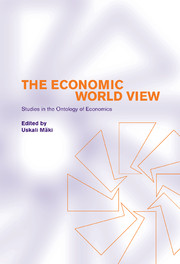Book contents
- Frontmatter
- Contents
- Notes on the contributors
- Preface
- I The what, why, and how of economic ontology
- II Rationality and homo economicus
- Part III Micro, macro, and markets
- 9 Essences and markets
- 10 The metaphysics of microeconomics
- 11 Ontological commitments of evolutionary economics
- 12 Is macroeconomics for real?
- 13 The possibility of economic objectivity
- Part IV The world of economic causes
- Part V Methodological implications of economic ontology
- Name index
- Subject index
12 - Is macroeconomics for real?
Published online by Cambridge University Press: 04 August 2010
- Frontmatter
- Contents
- Notes on the contributors
- Preface
- I The what, why, and how of economic ontology
- II Rationality and homo economicus
- Part III Micro, macro, and markets
- 9 Essences and markets
- 10 The metaphysics of microeconomics
- 11 Ontological commitments of evolutionary economics
- 12 Is macroeconomics for real?
- 13 The possibility of economic objectivity
- Part IV The world of economic causes
- Part V Methodological implications of economic ontology
- Name index
- Subject index
Summary
All are keeping a sharp look-out in front, but none suspects that the danger may be creeping up from behind. This shows how real the island was.
J. M. Barrie, Peter PanChildren are often thought to be peculiarly honest – witness the story of “The Emperor's New Clothes.” My title comes from a group of my academic children: first-year graduate students. I teach a mandatory class in macroeconomic theory to graduate students in both an economics department and an agricultural economics department. The students in agricultural economics are typically more interested in crop patterns or natural resources – relentlessly microeconomic topics – than in unemployment, GDP growth, or interest rates. Each year at least one student, who I assume comes from the agricultural economics department, writes on the anonymous class evaluation something like this: “If macro- economics were real economics – which it is not! – this would have been a good class.” What is one to say to the honest and piercing doubts of an academic child?
The idea that macroeconomics stands in need of a microfoundational base is a commonplace among economists. I shall argue that what motivates this belief are principally ontological concerns, naïvely, but pointedly expressed, in my students' questions about the reality of macroeconomics. I shall argue that ontological reduction of macro- economics to microeconomics is untenable. Thus, while the program of microfoundations may illuminate macroeconomics in various ways, it cannot succeed in its goal of replacing macroeconomics.
To begin at the beginning, it might help to define the key terms. “Macroeconomics” is sometimes thought to be the economics of broad aggregates, and “microeconomics” the economics of individual economic actions.
- Type
- Chapter
- Information
- The Economic World ViewStudies in the Ontology of Economics, pp. 225 - 245Publisher: Cambridge University PressPrint publication year: 2001
- 7
- Cited by



